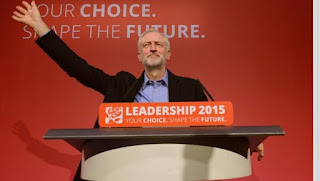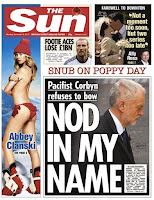Charlie Hebdo: "They have arms. Fuck them. We have the Champagne!"
Jonathan Calvert in the Sunday Times [£] on IAAF president Lord Coe and the doping scandal engulfing athletics: "Coe had the opportunity to reconsider when The Sunday Times and Seppelt revealed in August that the IAAF had ignored evidence of widespread doping among athletes. Instead he led a public relations campaign to undermine the disclosure. He gave interviews claiming it was his 'seminal moment' and that this newspaper’s article had been a 'declaration of war' on his sport."
Ken Livingstone, speaking on Russia TV's UK-based Going Underground, on press treatment of Jeremy Corbyn, via the Guardian: “The smearing of Jeremy is exactly what happened to me back in the 1980s and to Tony Benn. The key part of that is not just the smearing by some MPs, it’s the fact that four billionaires own three quarters of the papers that the British people read. I mean Murdoch, Lord Rothermere and the Barclay brothers. They will do anything to prevent a Labour prime minister who’s going to make them start paying their fair share of tax, because they’re all tax dodgers.”
Stewart Lee in The Observer: "Last week’s newspaper attacks on Jeremy Corbyn have moved from the dishonest into the deranged."
Jeremy Clarkson in the Sunday Times [£] on Jeremy Corbyn: "I’m getting a bit bored with the endless criticism of Labour’s little beardy man. And embarrassed, actually. Because he seems a nice chap, and endless criticism of every single thing he does will be driving him mad with despair. I don’t like that and think that if we want to bully someone, we should stick with his deputy, Tom Watson, who deserves everything you can throw at him, up to and including the tractor unit of a Scania lorry."
Bauer publisher Gareth Cherriman on the move to end publication of lads' mags FHM and Zoo: “I would like to thank our advertisers and retailers who have supported the brands and I’m sure that everyone who has worked on FHM and ZOO over the years will be sorry to hear this news.”
Peter Preston in the Observer: "Look around the developed world and paywalls are the norm for newspaper websites. Germany, the Netherlands and Slovakia, indeed, have gone further still, constructing a total wall around printed-press sites. Only Britain has a different balance: the FT, Telegraph and Times against the rest. Free access around the globe can produce startling figures – Mail Online has topped over 200 million a month - and such huge numbers allow the BBC to argue that its site causes nil problems. Except that huge numbers don’t equal profit, especially at a time when digital ad growth has stalled. Mail Online may rule the world, but it doesn’t make money yet. And, back in Britain, the existence of bbc.co.uk limits options and constrains development."
Sue Cameron in the Daily Mail: "I believe the real reason some politicians and officials want to curb FoI is simply to cover their backs. They want to stop the public knowing when there are disagreements between ministers, or between ministers and officials. They also want to stop the public knowing about any risks and potential downsides from policy decisions. Their fear is that these might be exploited by opposition politicians and the media."
Information Commissioner Christopher Graham in a submission to the Freedom of Information Commission: "The media plays an important role in FOIA as a user. Less than one in a thousand members of the public makes an FOIA request, so the media is the main route via which the public receives information disclosed via FOIA."
The News Media Association in a submission to the Freedom of Information Commission: "Diluting or reversing aspects of the Act would be a quixotic attempt to go against the grain of irreversible cultural and social change. A far better idea would be to look at the ways in which the Act could be extended so that it keeps up with the public’s evermore informed and discerning expectations of those in authority.”
[£] = paywall














No comments:
Post a Comment